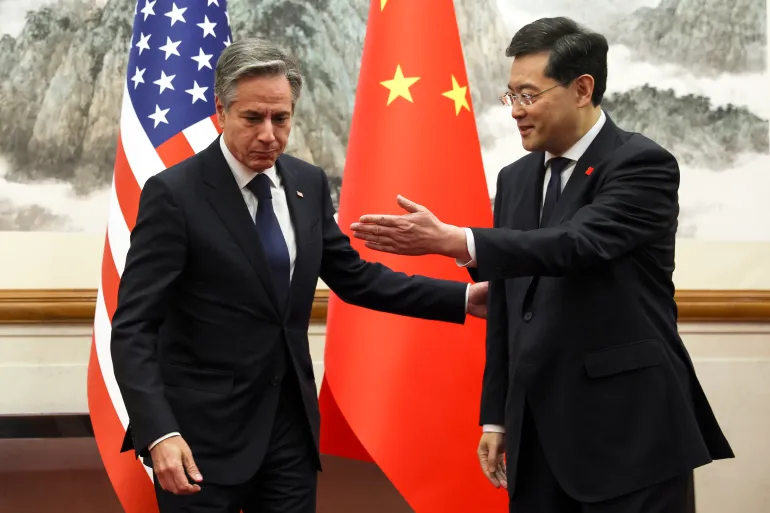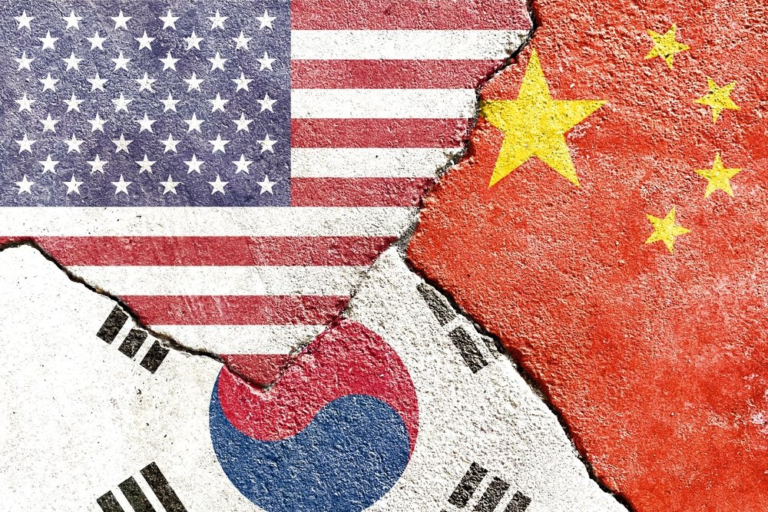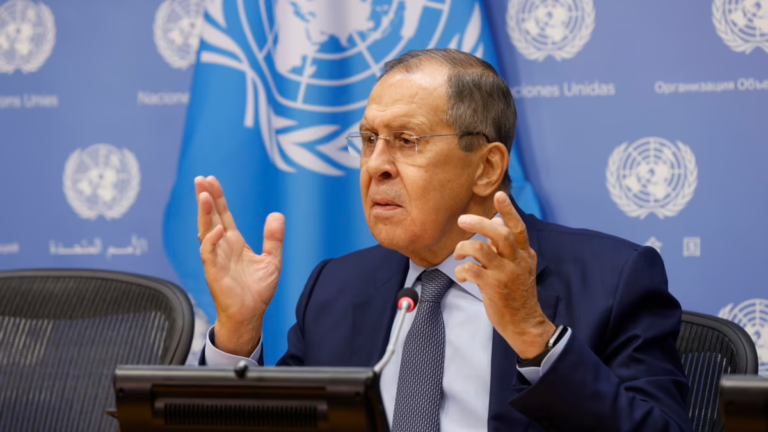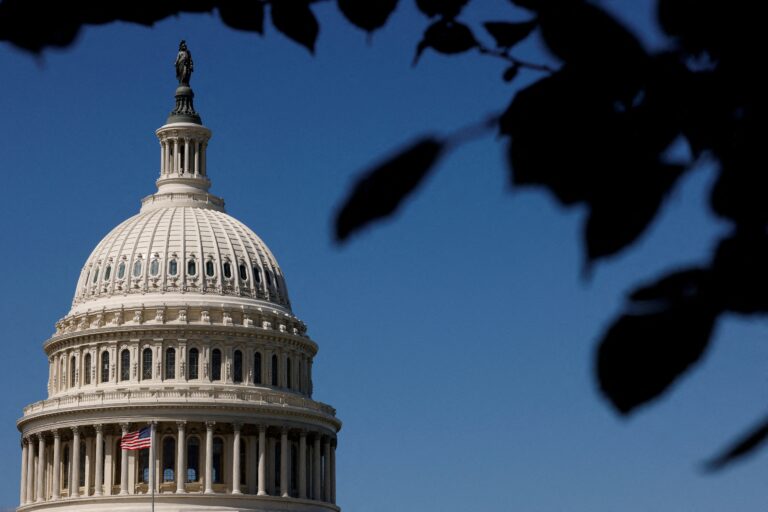The abrupt removal of China’s foreign minister Qin Gang after just seven months on the job could complicate efforts to revive tanking relations with the United States, according to analysts.
But experts said Qin’s unorthodox, high-profile removal — and subsequent replacement by former foreign minister Wang Yi — is not likely to result in a larger course change, given that China’s foreign policy is ultimately set by President Xi Jinping.
“Xi’s desire to improve ties with the US at the moment remains the same,” said Yun Sun, director of the China Program at the Stimson Center, a think tank in Washington, DC. “In that sense, the removal of Qin Gang is not going to have a huge impact on Chinese foreign policy, because the person who makes that decision is still the same person.”
Yun indicated that Wang’s appointment as Qin’s replacement demonstrated a desire for continuity. At 69, Wang previously served as foreign minister for nearly a decade until leaving the post in 2022. He was subsequently appointed director of the Chinese Communist Party’s Foreign Affairs Commission Office, the country’s top foreign policy decision-making body.
“He’s a safe choice,” Yun told Al Jazeera. “He is chartering the course at a time of instability.”
Qin, a 57-year-old former ambassador to the US, had not been seen in public since June 25, and Beijing has offered little information as to why, citing only “health reasons”. On Tuesday, the country’s top legislative body voted to remove Qin from his post.
That move accompanied a systematic scrubbing of Qin’s presence on the foreign ministry’s website, including records of June’s high-profile meeting with United States Secretary of State Antony Blinken in Beijing.
After that meeting, both Washington and Beijing hailed steady, if limited, progress in lowering tensions, which have soared in recent years over a panoply of issues, including trade, critical technologies, Taiwan and China’s actions in the East China Sea and the South China Sea.
But China is seeking to shake its post-COVID economic malaise, with shaky consumer spending, slowing exports and unemployment reaching record highs. By warming relations, experts believe China is seeking to kick-start its once buoyant economy — and relieve concerns about US efforts to limit access to critical technologies.
Washington, meanwhile, has said it is seeking to prevent regional disputes from escalating into full-scale conflict.
‘Internal matter’
Several analysts told Al Jazeera the nature of Qin’s removal indicates the decision was unlikely a reflection of his job performance. They cited the unusual circumstances as further evidence the removal is a potentially embarrassing “internal matter” that Beijing will seek to manage with as little disruption as possible.
Any fall from grace could be seen as a black eye for President Xi. Qin’s proximity to the president has been credited with facilitating his meteoric rise: Qin’s appointment in December 2022 made him one of the youngest foreign ministers in China’s history.
Rorry Daniels, managing director of the Asia Society Policy Institute (ASPI), noted that last November, China made the explicit decision to tone down its rhetoric about the US. There have been hiccups — an alleged Chinese spy balloon led to a flare-up in tensions at the start of the year — but otherwise “China has not returned to a deep hardening of external rhetoric”, Daniels said.
Meanwhile, high-level visits, including by US Treasury Secretary Janet Yellen and US climate envoy John Kerry, have continued in recent weeks, as have ministerial meetings. Daniels said the talks are laying the groundwork for Xi to visit the US city of San Francisco for the Asia Pacific Economic Cooperation (APEC) forum in November.
The summit is “certainly an opportunity that neither side wants to miss because it’s really important for the US and China to show to the other economies in APEC that they can manage this relationship well”, Daniels said.
She added Taiwan’s expected attendance has likely further motivated Xi to participate.
‘Awkward’
Qin’s removal could nevertheless lead to a “stiffer” approach from Beijing in negotiations with the US, according to Dennis Wilder, a senior fellow for the Initiative for US-China Dialogue on Global Issues at Georgetown University.
“It is relative. I’m not saying that they’d pull out of the negotiations or anything like that,” said Wilder, who previously served as the National Security Council’s (NSC) director for China. “But they might feel a bit more vulnerable and therefore not want to make any concessions or do anything that would indicate that, somehow, Xi Jinping needs to compromise with the Americans to re-establish his leadership.”
Wilder also pointed out that Wang — while serving as Qin’s replacement — will also continue his role as the head of the Foreign Affairs Commission Office, a position equivalent to the White House’s national security adviser.
“Being dual-hatted like that is a little bit unusual and awkward for the American side,” he added. “Because who talks to Wang Yi at what point?”
Personal relationships could also shift, affecting the dynamics of future coordination.
Previously, as a spokesperson for China’s foreign ministry, Qin had positioned himself as a “wolf warrior” — a term describing the confrontational approach of some Chinese diplomats. But in recent years, he tried “to engage and play nice” with his US counterparts, according to the Stimson Center’s Yun.
That was in contrast to Wang’s more “bad cop” role, which was particularly on display during a tense March 2021 meeting in Anchorage, Alaska. There, Wang accused US officials of “condescension” and said they should focus on their own domestic discontents.
Personal relations between Wang and Blinken also sank in February during a meeting in Munich, Germany, when the US diplomat warned China against providing lethal aid to Russia in its war in Ukraine.
“Wang Yi is a terrific candidate [for foreign minister], but he also has had some very, I would say, pungent or belligerent relations with his American counterparts,” Yun said.
On the flip side, Wang’s more extensive career has generally seen him gain deeper access with his US officials than Qin, the Asia Society’s Daniels said. That could prove an asset in navigating the tricky waters ahead.
“Relationships are really the currency of diplomacy,” she said, “and it is critically important that people sit down at the table with someone they’re familiar with.”
Source : AlJazeera







